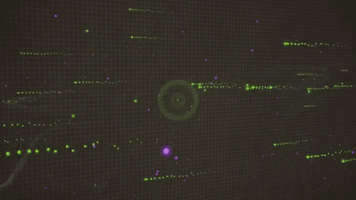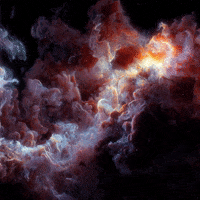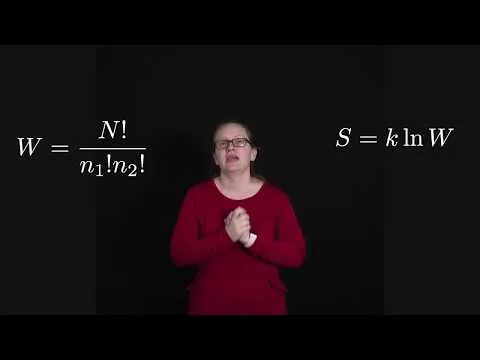

Entropy is perhaps one of the most fascinating and intriguing concepts in thermodynamics and its explanation may help us understand why the universe will eventually end. The second principle of thermodynamics tells us that the entropy of a closed system always increases with time, which in essence makes the universe "as time-sensitive" as it is. Entropy is a measure of the amount of disorder in a system, and the universe as a whole is doomed to a state of maximum entropy that corresponds to a configuration of particles in which there is no thermal energy available to do work, known as the thermal death of the universe.
The thermal death of the universe is a terrifying concept that refers to a distant future in which the universe will be completely disordered and inert due to an irreparable decrease in the amount of available thermal energy. As entropy occurs, the energy available for work gradually decreases, and eventually the universe will reach a state of maximum entropy. In this state, energy will not be able to flow and all stars will be extinct, including the Sun, and all chemical processes in the universe will cease to exist.
La entropía es quizás uno de los conceptos más fascinantes e intrigantes que existen en la termodinámica y su explicación podría ayudarnos a comprender por qué el universo eventualmente terminará. El segundo principio de la termodinámica nos dice que la entropía de un sistema cerrado siempre aumenta con el tiempo, lo que en esencia hace que el universo sea "tan sensible al tiempo" como lo es. La entropía es una medida de la cantidad de desorden de un sistema, y el universo como un todo está condenado a un estado de máxima entropía que corresponde a una configuración de partículas en las que no hay energía térmica disponible para realizar trabajo, conocido como la muerte térmica del universo.
La muerte térmica del universo es un concepto aterrador que hace referencia a un futuro lejano en el que el universo estará completamente desordenado e inerte debido a una disminución irreparable en la cantidad de energía térmica disponible. A medida que se produce la entropía, la energía disponible para el trabajo disminuye gradualmente, y eventualmente el universo llegará a un estado de máxima entropía. En este estado la energía no podrá fluir y todas las estrellas se habrán extinguido, incluyendo el Sol, y todos los procesos químicos en el universo dejarán de existir.

It seems that this fate is inevitable, even for a technologically advanced civilisation, but what does it really mean for us, as human beings, to live in a universe that is devoid of energy? Entropy plays an important role not only in thermodynamic processes, but also in our perception of time. In simple terms, entropy is often associated with disorder and dissolution of structure, but more precisely, it applies to any irreversible change in a system that results in a net increase in entropy.
In this sense, the perception of time is directly proportional to the amount of entropy in the universe. For example, the fact that we can remember the past and not the future is because we live in a universe that will become disordered as time passes. In other words, nature withers and decays as time progresses, and this is a direct consequence of the way entropy affects the universe. So, entropy influences our perception of the flow of time.
Parece que este destino es inevitable, incluso para una civilización de avanzada tecnología, pero ¿qué significa realmente para nosotros, como seres humanos, vivir en un universo que está desprotegido de energía? La entropía juega un papel importante no solo en los procesos termodinámicos, sino también en nuestra percepción del tiempo. En términos simples, la entropía a menudo se asocia con el desorden y la disolución de la estructura, pero más precisamente, se aplica a cualquier cambio irreversible en un sistema que resulta en un aumento neto en la entropía.
En este sentido, la percepción del tiempo es directamente proporcional a la cantidad de entropía existente en el universo. Por ejemplo, el hecho de que podamos recordar el pasado y no el futuro se debe a que vivimos en un universo que se desordenará cuando el tiempo pase. Dicho de otra forma, la naturaleza marchita y decae mientras el tiempo avanza, y esto es una consecuencia directa de la forma en que la entropía afecta al universo. Entonces, la entropía influencia la percepción que tenemos sobre el flujo del tiempo.


Almost all scientists would agree that the universe cannot remain forever in its present state of order and structure, but is inescapably heading towards its end. Life as we know it can only exist in a system that is not in stable equilibrium, i.e. that has not reached maximum entropy. Indeed, life could be seen as a struggle against entropy, as organisms control the energy flowing through them to keep themselves structured and avoid collapse. However, as entropy increases, this struggle becomes increasingly difficult and eventually unsustainable.
In theoretical terms, the end of the universe is a kind of inevitable catastrophe. This catastrophe is rooted in the design of the universe, and its fate is hardwired from the instant it was created. A combined exertion of temperature and entropy will result in the entire universe reaching a uniform temperature, where there are no more places where energy can be released. This will leave everything that exists today in a homogeneous and lifeless state, except for darkness.
Casi todos los científicos estarían de acuerdo en que el universo no puede permanecer para siempre en su estado actual de orden y estructura, sino que ineludiblemente se dirige hacia su final. La vida tal como la conocemos solo puede existir en un sistema que no esté en equilibrio estable, es decir, que no haya alcanzado la máxima entropía. De hecho, la vida podría ser vista como una lucha contra la entropía, ya que los organismos controlan la energía fluyendo a través de ellos para mantenerse estructurados y evitar el colapso. Sin embargo, a medida que la entropía aumenta, esta lucha se vuelve cada vez más difícil y eventualmente insostenible.
En términos teóricos, el fin del universo es una especie de catástrofe inevitable. Esta catástrofe está enraizada en el diseño del universo, y su destino está cifrado desde el instante en que se creó. Un esfuerzo combinado de la temperatura y la entropía resultará en que el universo entero alcance una temperatura uniforme, donde no hay más lugares a los que se pueda librar la energía. Esto dejará todo lo que existe hoy en día en un estado homogéneo y sin vida, excepto la oscuridad.

Ludwig Boltzmann, a 19th century Austrian theorist, explained the probabilistic nature of entropy in his entropy formula, which states that entropy is proportional to the probability of a system being in a state of confusion. This theory makes it clear that it is inevitable that disorder or entropy will increase as the atoms that make up the universe exist longer and longer.
The inevitable fate that we and our universe will suffer is overwhelming, but it is also a lesson to humanity about our nature. Life and existence have a beginning and they have an end. We have to live accordingly and appreciate the time we have. We also need to be aware of what we do with our lives and the world around us, for everything we do will sooner or later influence the realisation of thermal death in the universe as we know it.
Ludwig Boltzmann, un teórico austriaco del siglo 19, explicó la naturaleza probabilística de la entropía en su fórmula de entropía, que afirma que la entropía es proporcional a la probabilidad de que un sistema se encuentre en un estado de confusión. Esta teoría hace visible, que es inevitable que el desorden o entropía aumente conforme los átomos que componen al universo existan más y más tiempo.
El inevitable destino que sufriremos y nuestro universo es abrumador, pero también es una lección para la humanidad sobre nuestra naturaleza. La vida y la existencia tienen un inicio y tienen un fin. Tenemos que vivir en consecuencia y apreciar el tiempo que tenemos. También tenemos que ser conscientes de lo que hacemos con nuestra vida y con el mundo que nos rodea, ya que todo lo que hacemos, tarde o temprano influirá en la realización de la muerte térmica del universo como lo conocemos.

